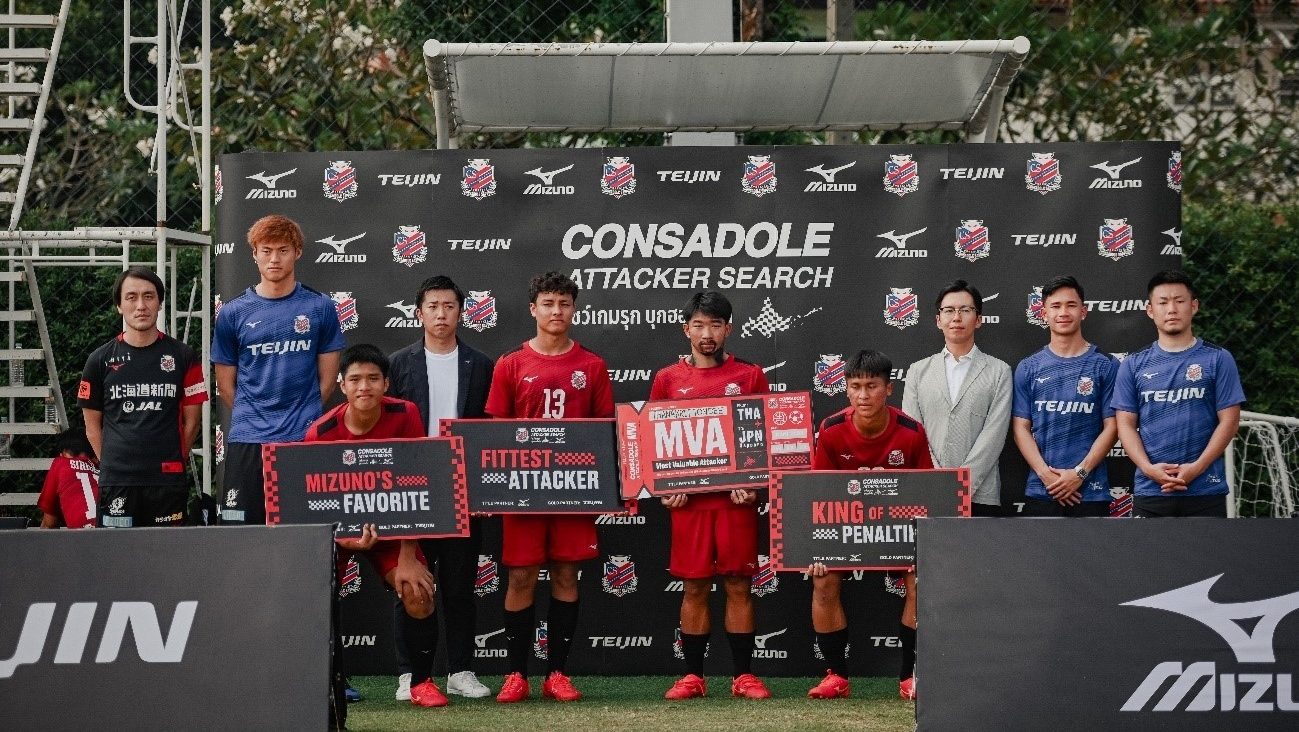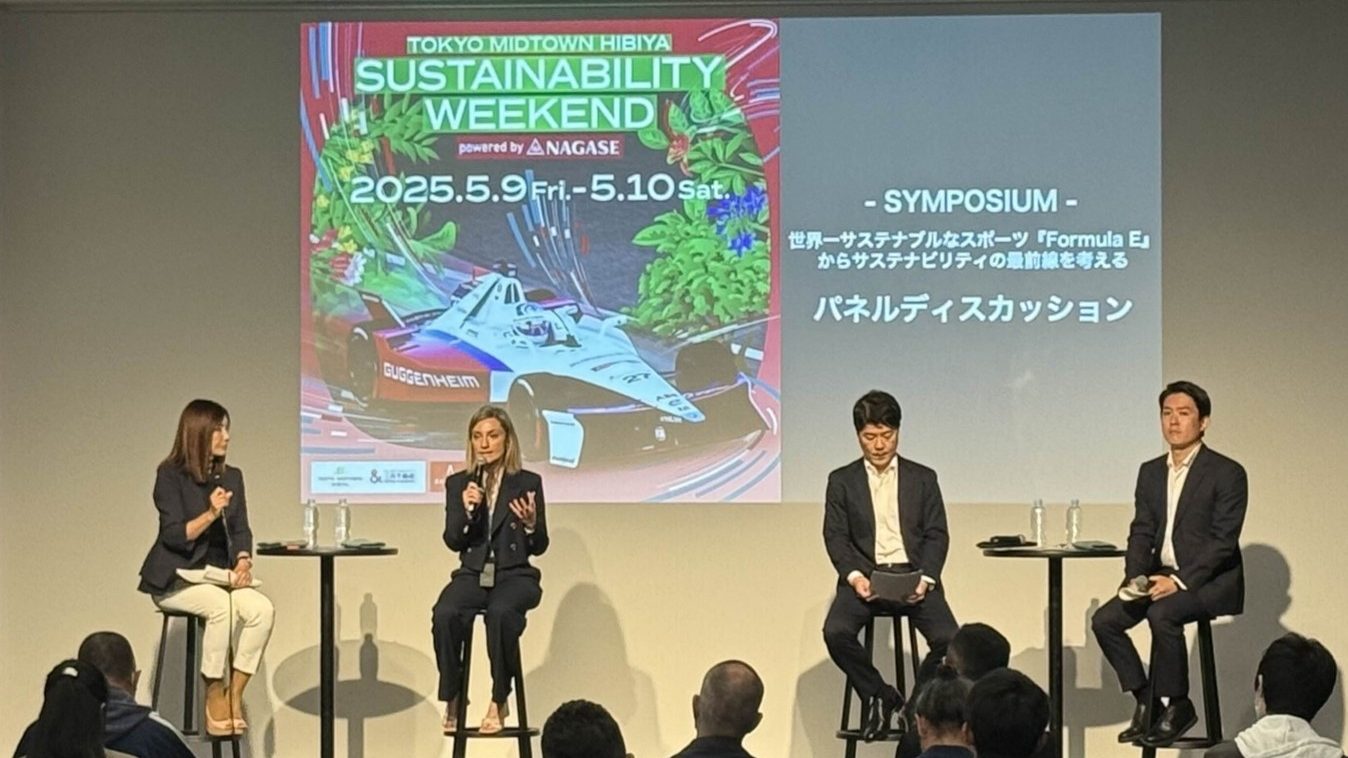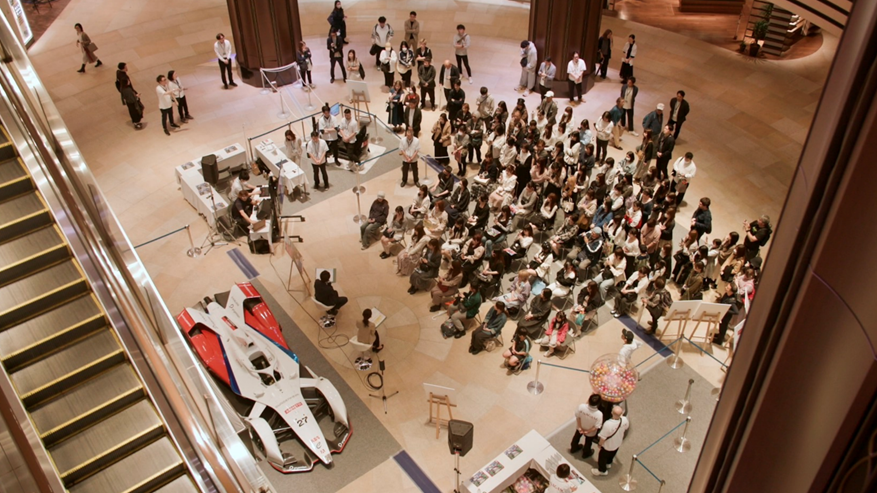
The Japan round of the international volleyball tournament “Volleyball Nations League (VNL) 2024,” the last chance to qualify for the Paris Olympics, was held over two weeks from June 4 to June 16, 2024, in Kitakyushu City, Fukuoka Prefecture. Such large-scale international sporting events have significant meaning in realising international exchange, inspiring masses of people, and further promoting regional economic development. On the other hand, there also is critique that hosting such events have a negative impact on the environment. This article introduces the “Kaitori Daikichi VNL2024 Fukuoka) realised through a partnership between the International Volleyball Federation/Volleyball World (hereafter referred to as FIVB/VW), the strategic partner in Japan, CB, Ltd, and the local government of the host region, Fukuoka Prefecture, to realise the embodiment of concepts such as the SDGs and One Health, while bringing economic impact of over 3.6 billion yen to Kitakyushu City and Fukuoka Prefecture.
Volleyball Tournament for Olympic Qualification
To begin with, I will share the background and features that lead to the success of the VNL2024 Fukuoka Tournament.
1. Global Popularity of Volleyball
Volleyball is a sport that enjoys one of the highest number of players worldwide (estimated at 500 million). In Japan, approximately 2.9 million people had reportedly played volleyball at least once a year in 2017 (The 2018 SSF National Sports-Life Survey). Volleyball also ranks amongst the top sports that Japanese like watching on Television.
2. What is the Volleyball Nations League (VNL)?
The VNL is considered one of the three major international tournaments for Volleyball, alongside the Olympics and the World Championships, and is an international competition established by FIVB in 2018. The top teams of the world, including 16 teams in the men’s and women’s categories, travel around the world competing in preliminary rounds, and the top 8 teams with the highest points can advance to the final round, where the tournament determines a champion. Seven of the 12 slots of men and women each for the Paris 2024 Summer Olympics were already determined in 2023, and the Japan men’s national team had secured their qualification before this tournament.
The remaining 5 slots were to be determined by the world rankings at the end of the VNL2024 preliminary round. It was the last chance for the remaining teams to qualify for the Paris 2024 Olympics, and naturally the tournament attracted high global attention. As many would know, the women's Japan national team performed well in this tournament and won their ticket to Paris, just as the catchphrase on the tournament poster reads: “From Fukuoka to Paris!”

3. Large-Scale International Sporting Events and SDGs
Regarding large-scale international sporting events, Ban Ki-moon, who was the United Nations Secretary-General when the SDGs were adopted stated that, “With planning and vision, mega sport events can advance social development, economic growth, educational opportunity, and environmental protection. They also provide a platform to promote the values and objectives of the United Nations, including peace and human rights. Mega sporting events can and should contribute to realising the newly adopted Sustainable Development Goals (SDGs).” Large-scale international sporting events hold significant values of the international community, including peace and human rights, and have the power to promote SDGs, such as economic effects in the host location.
On the other hand, it is not rare for large sporting events to receive various critique from a negative impact perspective, such as increasing CO2 emissions from large-scale construction and generation of a lot of so-called “food waste,” that is, excessive procurement of food ingredients at places where event-related personnel stay and leftover bento meals provided for athletes and staff. Additionally, we as responsible organisers could not ignore the amount of waste generated by the large concentrated crowds of spectators coming to watch the events. We understood that the negative impact on the environment by hosting events had become a major issue and believed it was important to address as honestly as possible these issues.
Noteworthy SDGs of the VNL2024 Fukuoka Tournament
The VNL2024 Fukuoka was organised in a unique format, where it was the first event jointly organised by FIVB/VW, CB as Japan strategic partner, and the local government of Fukuoka Prefecture. It transcended commercial values and successfully created a new business and operation model for its sustainability, integrating with the local community to prioritize environmental damage reduction and the vision of a positive future for children. Based on the outcome, I can proudly say that, as a member of the VNL 2024 Fukuoka Organising Committee, we together were able to elevate this tournament into an event that is socially beneficial and with positive lasting impact.

1. "One Health" was the decisive factor for the host location
On January 31, 2024, during the joint press conference held at the Fukuoka Prefectural Office, Mr. Fabio Azevedo, the General Secretary of FIVB, stated that a decisive factor for choosing Fukuoka Prefecture as the host for the VNL2024 Japan round was the prefecture's dedication to "One Health," which aims to protect the health of people, animals, and the environment integrally. A notable feature of this tournament was the partnership between the FIVB/VW and the local government, which has been actively working on environmental issues.
Furthermore, FIVB/VW and CB, Ltd were firmly committed to hosting the event in a regional city in Japan to bring the opportunity for the local people to see international volleyball at its best, while aiming for a tournament with lower environmental damage under the leadership of local governments, without leaning solely towards commercialism. The partnership with Fukuoka Prefecture enabled the Organising Committee to realise an innovation and I believe this will become a new model for hosting international volleyball tournaments in Japan. It is our view that creating the opportunity for world-class players to interact with fans across the host country, will not only help in promoting an increase in volleyball enthusiasts but also contribute to regional revitalizasion.
2. Promotion of SDGs through a Strong Partnership between FIVB/VW and Fukuoka Prefecture
The VNL2024 Fukuoka emphasized SDGs from the outset and, to solve various issues, was prepared meticulously by the partnership between FIVB/VW, the strategic partner CB, Ltd, Fukuoka Prefecture, and the Organising committee, which was responsible for embodying these parties' philosophies.
3. An Initiative of the Tournament to Create Sustainability
Environmental damage and food waste are among the negative effects that large-scale international sporting events have on the environment. Addressing these issues is the touchstone of making the events sustainable.
The first step was to select the venue. Since Kitakyushu City did not have permanent sports facilities capable of hosting a large-scale volleyball tournament, the Organising Committee decided to set up temporary stands at the West Japan General Exhibition Center, a 5-minute walk from Kokura Station. Construction began 9 days before the event to build as large-scale as approximately 8,000 spectator seats and assembled parts equivalent to 25 ten-ton truckloads.
Most materials used were recyclable and reused instead of discarded after the event. Construction companies also took the lead in cooperating with the SDGs initiative. They successfully reduced CO2 emissions from 18.573 tons to 4.033 tons, a reduction of 14.540 tons (78%) by shifting usual truck transportation from Chiba to Kitakyushu, to freight rail transport.
The temporary stands were designed with particular attention to the angle and layout of the seats to ensure that the court was visible from any seat. The satisfaction of the ‘Excite Seats,’ located almost on the court in the front row, was enhanced, and the design also allowed spectators in the rear seats to feel close to the court so that all spectators could experience the intensity and immediacy of the game, making watching the matches more exciting and enjoyable than ever before.

The second part of this column, available on a separate page, introduces new initiatives undertaken to achieve the SDGs and support the children who will shape the future, as well as the achievement of the tournament which generated an economic impact of over 3.6 billion yen and a publicity effect exceeding 30.2 billion yen.
◇AOYAMA Aria
Volleyball World Strategic Partner, Japan (CB,Ltd); Chief Operating Officer of CB, Ltd
After working for an international consulting firm in Israel, she served as an international public relations advisor for government agencies. She joined CB, Ltd as an executive in 2017. As an expert in cultural diplomacy, she continues to promote the allure of Japan and acts as a bridge between Japanese and international cultural figures, diplomats, and sports federations, aiming to achieve a peaceful and stable international society. She also serves as the Representative Director of the Japan Institute of Culture & International Exchange, Director of the Japan Para Climbing Association, a Director of the X Games Japan Executive Committee, and the Vice Chairperson of the VNL2024 Fukuoka Tournament Organising Committee.
* The affiliation and titles were as of October 2024, when the column was written.
Note: This article was originally published in Japanese on Nov 14, 2024. The original article can be accessed here.







